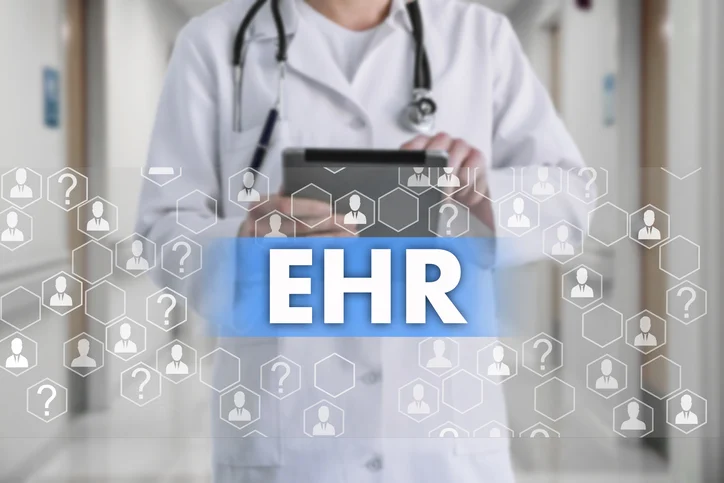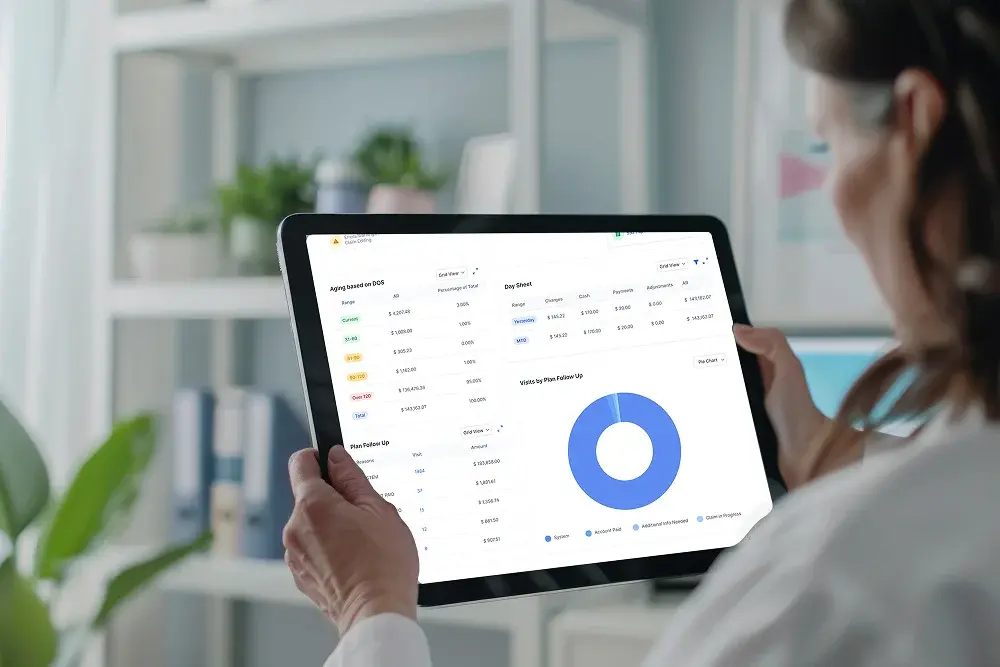If you are still bogged down by the complexities of traditional medical billing, it is high time you consider integrating EHR in medical billing. Using outdated billing systems causes billing errors and stacks of paper,...
Healthcare practices manage an extensive repository of patient data every day, encompassing everything from clinical histories to demographic information. The challenging part for a healthcare practice is the storage, maintenance, and convenient retrieval of this data.
For decades, the healthcare sector has relied on paper-based records for data storage and management. However, as technology advances, the traditional practice of printing and storing data on paper has become outdated. To ensure secure data storage and convenient access, transitioning from obsolete paper-based records to more secure and efficient methods of data storage and management becomes crucial.
That’s where electronic health record software comes into play. EHR has revolutionized how healthcare practices manage patient data. To move away from laborious and costly paper-based records to a more convenient way of maintaining patient data, understanding this innovative method of data storage and management is the first crucial step in the right direction.
Understanding Electronic Health Record (EHR)
An EHR is a digital version of a patient's paper chart, which includes all of the same information - and sometimes more - but in a format that can be easily accessed, shared, and updated by authorized users, In this blog post, we provide a comprehensive overview of EHR, including:
- What is EHR?
- The history of EHR
- The benefits of EHR
- The Importance of EHR in Modern Healthcare Setup
Whether you're working with an outdated system of paper charts and looking to switch to electronic health record software or are just simply curious about what an EHR is, this comprehensive guide on electronic health records (EHR) will be a valuable resource.
What Is Electronic Health Record (EHR)?
To explain in the simplest way possible, an electronic health record (EHR) is a digital version of a patient’s data chart. However, an electronic health record goes beyond simply digitizing paper records. EHRs are designed to be a complete record of a patient's care from the very first visit to the present day. Every electronic health record (EHR) contains these three types of patient data:
- Clinical information: It encompasses the patient’s height, weight, past medical history and prescriptions, allergies, etc.
- Demographic information: It contains information regarding the patient’s date of birth, age, gender, and contact information.
- Administrative information: It includes non-clinical patient data, such as patient ID, insurance details, billing and payment information, etc.
This data can then be broken down into even more specific categories, such as:
- Age, race, and gender
- Address and contact information
- Diagnosis
- Medical history
- Medications
- Allergies
- Immunizations
- Treatment plans
- Lab results
- Radiology images
- Vitals
- Insurance information
With all of this information in one place, EHRs can provide a more holistic view of a patient's healthcare journey.
The History of EHRs
Although the term "electronic health record" is relatively new, the concept of a digital patient chart is not. In fact, EHRs have been in development since the 1960s. Mayo Clinic in Rochester, Minnesota, was one of the first extensive medical systems to use an EHR. However, EHRs were so costly in the 1960s that the government solely utilized them in collaboration with healthcare institutions.
It took 20 years for EHRs to become more affordable and accessible for private practices. In the 1980s, individual healthcare providers began using personal computers to store patient health information electronically. This allowed small groups of healthcare providers to share patient data within their own practices.
Fast forward to the present day, the use of EHR software has become widespread in the healthcare industry. From solo practitioners to large hospitals, most medical providers now use some form of electronic health record, and the information is shared across multiple platforms and institutions nationwide.
The Benefits of EHR Software

Electronic health record software brings along numerous benefits for a healthcare practice. Let's take a look at a few of the most significant benefits of EHR software:
- Improved Patient Care
When all of a patient's information is stored in one place, it's easier for providers to make informed decisions about their care. Electronic health record software also makes coordination between different healthcare providers easier, leading to better overall patient outcomes.
An electronic health record (EHR) software like Practice EHR provides healthcare providers and the medical and administrative staff with convenient access to patient data from one place. This boosts the pace at which a healthcare practice proceeds with various crucial steps of optimal patient care.
- Reduced Costs
One of the most significant benefits of EHRs is that they can help reduce the cost of healthcare. By streamlining administrative processes and reducing the frequency of duplicate tests, EHRs help save time and money.
Practice EHR provides electronic health record (EHR) services in addition to reliable practice management services. Blending its highly secure and efficient EHR services with exceptionally reliable practice management services, Practice EHR offers a cost-effective solution for your healthcare practice needs.
- Increased Efficiency
EHRs can help medical practices run more efficiently. With features like automated billing and appointment reminders, providers can spend less time on administrative tasks and more time seeing patients.
Practice EHR makes onboarding a breeze for the medical as well as administrative staff. The intuitive design of its cloud-based electronic health record software enables convenient navigation for a streamlined and efficient operation of any healthcare practice.- Convenient Access to Patient Data
EHRs provide practitioners and medical and administrative staff with access to patient data anytime, anywhere. This is especially beneficial for providers who work in multiple locations or for after-hours care.
Convenient and quick access to information is secondary to the security and confidentiality of patient data and information. Practice EHR offers a highly secure cloud-based storage option, guaranteeing the safety and privacy of patient data in addition to its convenient access.
The Importance of EHR Today

As evidenced by the offered benefits, electronic health record software provides a lot of advantages for both patients and providers. As a result, integrating EHR into its system has become crucial for any healthcare practice.
With the rise of value-based care, healthcare providers are being reimbursed based on the quality of care they provide, not the quantity. This means that providers need to be able to track and measure patient outcomes in order to improve them, and it is EHR software that can deliver the data that medical professionals need to achieve this goal effectively.
It's crucial to acknowledge that patients now anticipate their healthcare providers to use EHRs. They might opt for a different practice if this expectation is not met. EHRs are becoming more and more common in today's digital world. In order to stay competitive, medical practices must switch to reliable and efficient electronic health record software.
Practice EHR - The Only EHR Software Your Practice Needs!
Electronic health record software is a crucial part of the healthcare industry. By improving patient care, reducing costs, and increasing efficiency, EHRs are changing the way healthcare is delivered. If your practice is not using an EHR system, now is the best time to start.
Here at Practice EHR, we offer a complete EHR solution for medical practices of all sizes. Our software is user-friendly, affordable, and can be customized to fit the needs of your practice.
REQUEST A FREE DEMO, or try it out yourself with a free trial. Practice EHR is one click away from transforming the way you operate your healthcare practice by bringing to the table unparalleled efficiency, convenience, and security!
Topics: Integrated EHR, Small Practice, EHR Solution, Specialty-Specific EHR, New Technology, Cloud-based EHR, EMR, EHR, Technology in Healthcare
RECENT POSTS



TOPICS
- EHR Solution (186)
- EHR (121)
- Patient Care (113)
- digital age (113)
- Specialty-Specific EHR (106)
- Medical Billing (100)
- Industry Update (86)
- Technology in Healthcare (82)
- Small Practice (75)
- EHR Features (72)
- Medical billing services (68)
- Integrated EHR (61)
- HIPAA Security (56)
- RCM (56)
- New Technology (47)
- Healthcare Office Management (40)
- Telemedicine (39)
- Cloud-based EHR (38)
- Practice EHR News (38)
- Kiosk (32)
- Revenue Cycle Management (23)
- ePrescribing (21)
- AI Solutions (20)
- AI Scribing (13)
- EMR (12)
- Practice Management Software (11)
- Client Favorites (10)
- Practice Automation (10)
- Switching to New EHR (10)
- TeleVisit (10)
- The ONE (10)
- MACRA/MIPS (8)
- Patient Portal (8)
- Urgent Care (8)
- Best EHR Software (7)
- E-Prescribing (7)
- AI EHR (6)
- AI Scribe (6)
- Product Updates (6)
- events (6)
- AI scanning (5)
- MIPS (5)
- Psychiatry EHR (5)
- Insider (4)
- Internal Medicine EHR (4)
- MIPS Reporting (4)
- Mobile EHR (4)
- Orthopedics EHR (4)
- Podiatry (4)
- Podiatry EHR (4)
- Telehealth Platform (4)
- AI-powered Medical Billing (3)
- Best EHR Practice (3)
- Chiropractic EHR (3)
- Digital Experiences (3)
- EHR for Chiropractors (3)
- Family Medicine EHR (3)
- HIPAA (3)
- Patient Check-in Kiosk (3)
- PracticeEHR GO App (3)
- Regulatory Updates (3)
- Telehealth Platforms (3)
- Automated Health Tools (2)
- Billing for Private Practices (2)
- Clearinghouse (2)
- Dermatology EHR (2)
- EHR Scheduling (2)
- Eligibility Verification in Medical Billing (2)
- Foot and Ankle Care (2)
- Foot and Ankle EHR (2)
- Health records 101 (2)
- Integrated Practice Management (2)
- Medical Credentialing (2)
- Medical Practice Management Software (2)
- Quality of Patient Care (2)
- Reporting Under MIPS (2)
- Risk and Liability in Medical Settings (2)
- What Works Clearinghouse (2)
- AI Scan (1)
- Bariatric EHR (1)
- Behavioral Health Practices (1)
- Billing Communication (1)
- Cardiology EHR (1)
- Cash Flow (1)
- Cashless Payments (1)
- Charting (1)
- Data Security (1)
- Dos and Don'ts (1)
- EHR Guides (1)
- EHR Implementation (1)
- EHR KPIs (1)
- EHR Questions to Ask (1)
- EHR Transition (1)
- EHR for Chronic Illness (1)
- EHR for Small Practices (1)
- EMR vs EHR Difference (1)
- ENT EHR (1)
- Endocrinology EHR (1)
- Family Medicine (1)
- Gastroenterology (1)
- Gastroenterology EHR (1)
- General Surgery EHR (1)
- Geriatric AI scribe (1)
- Geriatrics EHR (1)
- Guides (1)
- Healthcare Compliance Certification (1)
- Healthcare Practice Office Management (1)
- Help Center Videos (1)
- Insurance Reimbursement (1)
- KPI (1)
- Key Performance Indicators (1)
- Lab Processing (1)
- MACRA (1)
- Medical Billing Partner (1)
- Medical Coding Services (1)
- Multilingual AI Scribe (1)
- Nephrology EHR (1)
- Neurology EHR (1)
- Pain Management EHR (1)
- Pediatrics EHR (1)
- Physical Therapy EHR (1)
- Practice Cash Flow (1)
- Practice Efficiency (1)
- Pulmonology EHR (1)
- Reconsider Your EHR (1)
- Simplify Practice Management (1)
- Staffing in Healthcare (1)
- Switch Medical Billing Providers (1)
- Urgent Care Medical Billing (1)
- Urology EHR (1)
- Voice-Activated AI Scribe (1)
- insurance claim denials (1)








